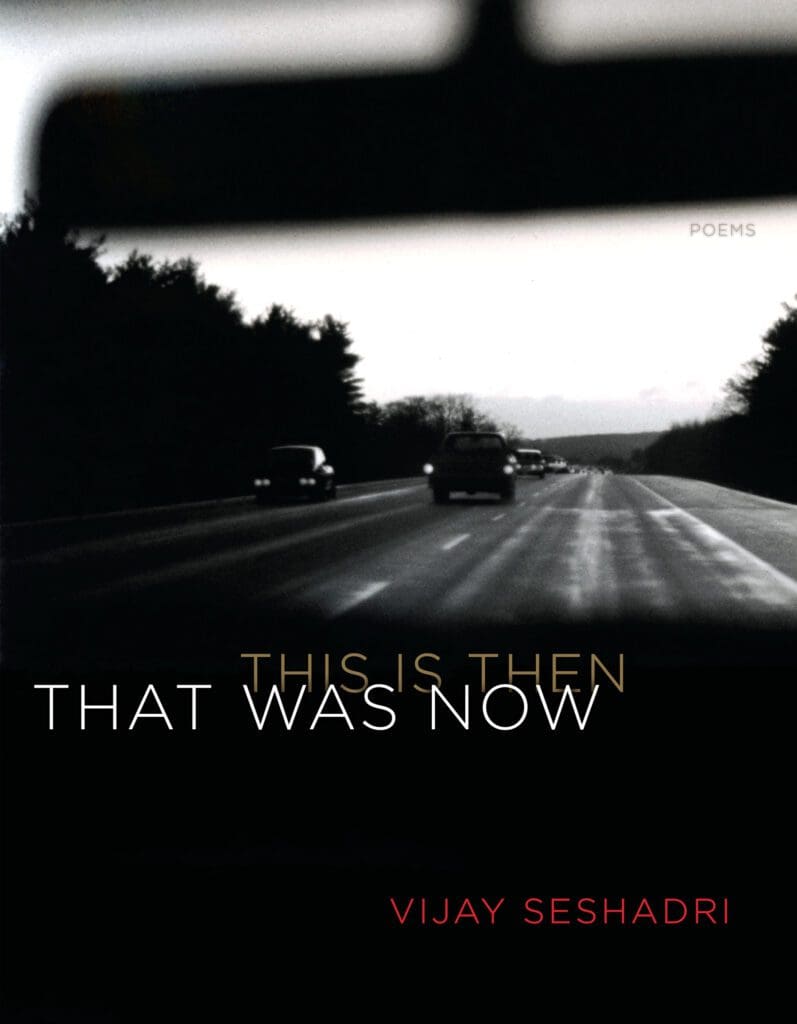Time seems to have become an alien concept in recent months. In this sense, That Was Now, This Is Then (Graywolf Press; 80 pages), the new collection by Pulitzer Prize-winning poet Vijay Seshadri, offers an uncanny relevance. It would be difficult to offer a faithful summary of the collection as even in its brevity, the book covers a stunning number of topics: from bereavement and the detriments of modernity to Hegel and robocalls. The poems strikes a rare balance of humor, poignancy, and intellectualism. Seshadri crafts a poetic narrative that obliterates any linear conceptions of time and human experience, armed with acute self-awareness, an unwillingness to shy away from even the most absurd of subjects, and a propensity for wordplay and twist endings.
That Was Now… is thrilling in great part because it irreverently experiments with form. Through a range of styles including pseudo-screenplays, rhyming quatrains, and margin-to-margin prose poetry, Seshadri pursues unconventional avenues of poetic presentation. In many ways, this exploration reflects Seshadri’s greater mission to subvert boundaries—of time, of author and reader, of the subjective self. Through the unconventional manipulation of space and text on the page, he invites the reader to question the constraints of the very medium through which he funnels his ideas.
Most distinctive about That Was Now… is its ability to unpretentiously introduce deeply cerebral and conceptual notions of alternative time, space, and memory. The deceased speaker in “Who Is This Guy?” straightforwardly describes what they perceive as the state of the living:
…what they’ve lost
isn’t lost at all, but is there, right there,
dancing on the other side of time—
what they were and what it was,
what it meant and what it means
just on the other side of time.
These concepts could easily become tedious, but Seshadri carries a confidence and ease of voice that refuses to collapse under the complexity of his ideas. His poetry never seems essayistic, nor esoteric. Despite frequently plumbing the depths of his own psyche, it’s clear the collection was written in imagined conversation with readers—it is a book that seeks to inform, rather than serve solely as an outlet for the author’s craft. Further, the speaker often assumes a lighthearted and humorous tone that renders the collection more digestible, such as in “Robocall,” in which heady existentialism is interrupted by the ever-familiar phrase “Para español oprima número tres.”
While That Was Now… strives to tackle sweeping questions of time and memory, it also offers a rare vulnerability, particularly in its poems concerning the death of Seshadri’s father. It becomes clear after reading said poems that they are the crux of the collection: each one is informed by a grief so fully embodied that it eviscerates any normative conception of time, place, and self. In one of the book’s most stunning poems, “Collins Ferry Landing,” Seshadri meditates not only on the death of his father, but on the death of self when confronting loss:
I wasn’t just feeling grief but congratulating myself for it…That wasn’t the real strangeness, though. It was this: this sin of self-awareness, this dramatization of the self…was making apparent another person underneath. Another person suddenly arrived inside me.
That Was Now, This Is Then can be difficult to pin down. It vacillates between sincerity and impish ambiguity, and is more an exploration than a manifesto, despite Seshadri’s rejection of all things linear. But this is precisely what makes it so engaging. It is a thrill to watch every iteration of Seshadri’s speaker unravel and re-thread themselves on the page. Cheeky, intelligent, meditative, That Was Now, This Is Then is a collection that pulls the reader into such an orbit of intimacy and honesty that they quickly forget themselves as they peek through the pages and see themselves write out each stanza.

